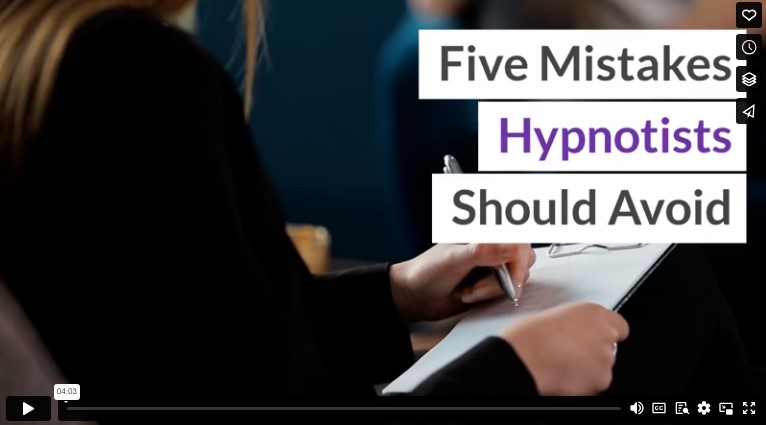Hypnosis class is over, and you’ve completed your certification training. You are ready to help people and make a living (or earn supplemental income) through hypnotherapy. However, before you dive into hypnotherapy, you should be aware of some basic mistakes that too many new hypnosis practitioners make. These issues limit your success and lead to disappointed clients. That’s no way to start a successful business.
Or perhaps you’ve been running your hypnosis business for a while and are looking for reasons why your sessions aren’t as productive and your calendar isn’t as full as you’d hoped. You can accelerate your success by avoiding these five common mistakes.
1. Not Getting a Thorough History
You’ve booked a client and are excited to put hypnosis to work, helping them through their challenges. So it’s time to start guiding them to a hypnotic trance, right? Not so fast.
Before you begin the hypnosis, get a thorough history. You need to understand your client’s past and how it affects the challenges they want to overcome with the help of hypnotherapy. If you don’t know how they got to where they are, it will be much more challenging to help them move on. You’ll also be operating blind to any pitfalls to avoid or sensitive subjects that might trigger your client if not handled sensitively.
When you invest time into learning about your client’s history, you’ll also be investing in a better rapport with the client. And that leads us to our next common mistake.
2. Not Taking the Time to Build a Strong Rapport
Hypnosis often deals with very personal, sensitive subjects. It can be challenging for clients to reveal those to a stranger. And being hypnotized can feel vulnerable or frightening to someone new to the experience. It is difficult to go through that with someone you met for the first time three minutes ago when they ushered you into their office.
Don’t rush to get to the hypnosis part of the hypnosis-client relationship. “Relationship” is the keyword there. Build a relationship with your client so they feel comfortable with you. Establishing a strong rapport with them will make it easier for clients to relax, trust you with their challenges, and achieve a hypnotic state.
3. Not Setting Clear Goals
It’s impossible to get where you are going if you don’t know the destination. Talk with your clients about their goals. That helps you define success and mark progress from your sessions.
Specific goals also help prevent a disappointed client who is frustrated about not losing weight when their stated goal is to stop smoking. If you remind them that the goal they set for themselves was related to their smoking, you can help them see that hypnosis hasn’t failed them; they just have additional challenges to work through and goals to achieve.
Setting goals at the beginning of a relationship with a client doesn’t mean you can’t adjust or add to their goals as your sessions continue. It’s fine to add weight loss to the goals of the frustrated smoker. But initial plans give you a place to start and a benchmark for measuring progress.
4. Not Setting Clear and Realistic Expectations
Establishing realistic expectations prevents disappointment and unhappy Yelp or Google reviews.
That means being realistic about what hypnosis can and cannot do. It also means clarifying that addressing challenges and fears will take multiple sessions. In many cases, these issues have been part of your client’s life for years; it’s unrealistic to think that one 60-minute session will free them from life-long problems. Once they understand that, their expectations will be more realistic. That means they will be more patient when looking for progress and more prepared to continue with their sessions until they have reached the place they hoped to be.
5. Not Continuing Your Education
All skills atrophy over time. Gradually, you may develop sloppy habits that hurt your hypnosis practice. Even if you are disciplined enough to avoid that, there’s always more to learn.
Continuous learning should be a cornerstone of your hypnosis business. Some of that can come through working with clients and evaluating your successes and struggles. You may find some education through networking with other hypnotists and sharing stories and advice. But you should also seek out advanced hypnotherapy training to improve your skills and learn new techniques.
Continuing your hypnosis training will teach you new skills and increase your confidence, making you an even more effective practitioner.
Avoiding these five mistakes can accelerate your hypnosis business. Weeding these blunders out of your practice can bring an existing hypnotherapy business from struggling to thriving. Wherever you are in the life of your hypnosis practice, be aware of these missteps so that you can achieve success with your business and for your clients.
Video

Infographic
After completing hypnosis certification training or running a hypnosis business, avoid the common mistakes many new hypnosis practitioners make. Accelerate your success by avoiding the five common mistakes listed in this infographic.




